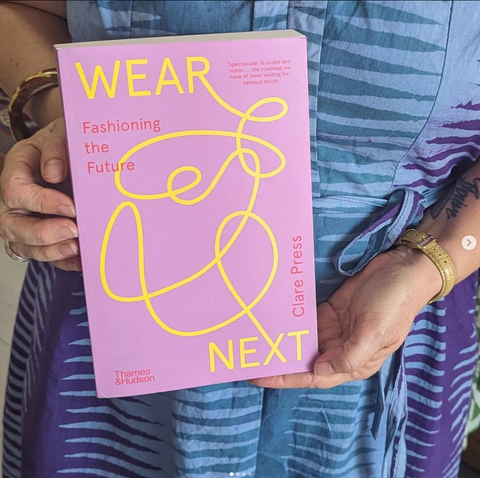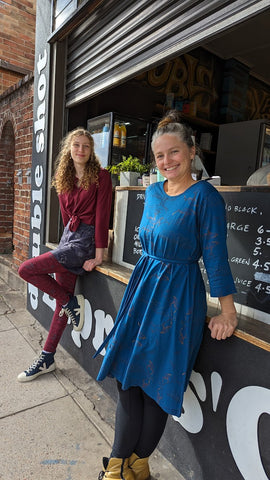Book Club Week One - Starts this Friday. Read this If You want to know more :)
How exciting, we are doing a book club!!!!! :D
This week is all about giving you an introduction on what the book is about , the author and the topic matter & how to get the book.
Why are we having a book club?
We hope to forge a united, supportive, and captivating community for those who share a passion for knowledge and aspire to become more knowledgeable about ethical fashion.
Format:
Very, very informal and a slow read as its more about digging into each topic. Perfect for the " I am not really a reader" type of book club.
No sign ups, just occasional meet ups (see at end of this blog for our first one), and you only need to come when you want. No obligations.
Every Friday we will focus all our social media posts on the topic chapters we have read for discussion.
We do this because we want to be advocates for ethical fashion.
How fast you read the book is up to you. You can even just read the topics you want to be involved in. However, please note the topics for our meet ups will reflect the chapters we are reading that week.
This is our reading schedule for the entire book club:
January - Unveiling the Fashion Ecosystem
Week 1: Get the book!
Week 2: What Now?, Today & Tomorrow (pg 1- 43)
Week 3: You Choose 1. Conscious (pg 47- 64)
Week 4: You Choose . 2. Fair (pg 67-82)
At the start of the year, we'll introduce you to the visionary Clare Press and set the stage for understanding the current state of the fashion industry.
February - Its all about LOVE
Week 5: You Choose . 3. Slow & 4. Even Faster (pg 85-117)
Week 6: You Choose 5. 7 Upcycled (pg 119 - 151)
Week 7: You Choose . 6. Community &. 7. Less (pg 137 - 166)
Week 8: You Choose . 8. Local and 9. Global (pg169 - 196)
In the month of love, we'll fall head over heels for the innovators and creative thinkers who are redesigning fashion from the ground up. Join our discussions on the groundbreaking solutions presented in "Wear Next" and be inspired by the possibilities. Plus, we will have an expert session with a local sustainable fashion guru! This month we will have a upcycle class and a fashion swap.
March - Envisioning the Future of Fashion
Week 9: You Choose . 10 Traceable (pg 199 - 209)
Week 10: You Choose . 11 Repaired & 12 Shared (pg 211- 235)
Week 12: You Choose . 13 Regenerative & 14 Biointeligent (pg 237 - 264)
In the final stretch, We'll delve into the future of work in the fashion industry and explore the impact of sustainable practices on employment. You will have the opportunity to engage in a hands-on workshop, to experiment with sustainable fashion DIY, and witness firsthand the transformative power of conscious choices
April - How far is too far with technology in fashion?. And then reflection and Review
Week 13: You Choose .15 Robotic (pg 267 - 276)
Week 14: You Choose . 16 Digital (pg 279 - 294)
Week 15: FASHION REVOLUTION WEEK - Reflection and Review
Our journey culminates in how far technology has come. We will then have a reflection on the transformative insights gained from "Wear Next."
This is the book:

To get a copy simply search "wear next fashioning the future" in google and a list will come up of various book stores and suppliers. I got mine through QBD Books at Charlestown - They ordered my copy for me, their phone number is (02) 4910 0419.
About the author:
Clare Press is a Sydney-based sustainability communicator, filmmaker, author and presenter.
Clare was the first ever VOGUE Sustainability Editor (Vogue Australia, 2018-2020) - a pioneering role in international media.
She was also the first Global Ambassador for the Ellen MacArthur Foundation’s Make Fashion Circular initiative, and has been a member of Australian advisory board of Fashion Revolution since 2014. She sits on Copenhagen Fashion Week’s Sustainability Advisory Board, and is part of Fashion Roundtable in the UK. In 2019, she won the a Sustainability Champion Award from the New South Wales government.
What’s the book all about?
Wear Next imagines 16 scenarios for our fashion future, from slowed down, upcycled & community-based to fast-paced and AI-enabled, from local to global, regenerative & biointelligent.
Kinda like a “choose your own adventure” - Clare Press
It’s a provocation & an invitation: what kind of fashion future do YOU want to be part of?
What others are saying...
“Clare Press invites us to collectively envision a future of fashion that is just and joyful! Spectacular in scope and vision, this book is the roadmap for the fashion evolution we have all been waiting for, one rooted in respect, reciprocity & resourcefulness.’” — Nathalie Kelley, actor & activist
“Most of us know how environmentally destructive and socially damaging fast fashion can be, but it doesn’t have to be this way. Clare Press speaks to innovators ... [whose] shared objective is to design a greener, regenerative and safe fashion industry.” — Artshub
“Clare Press has had enough of the doom & gloom surrounding sustainability. Her latest tome is an optimistic look at fashion’s roadmap for the future.” — Harper's Bazaar
What to do this week:
1. To get an idea of the book and what we will be digging into. Please listen to an interview that with Clare Press with Alexx Stuart Lox Tox Life (Click on link):
Show #362 Clare Press Asks “Wear Next” As We Talk Fashion Into The Future
2. Every Friday (starting on the 5th Jan) we will post on Face Book and Instagram - We encourage you to participate, and would love you to share stories and share your perspective. This Friday we are going to ask you to share your fashion journey with fellow members and explore what you know of the wasteful aspects of the industry.
3. Put in your diary and let us know if you are coming to our first meet up : Martha Cocktails and Con - 14th Jan - 2:30pm (Very limited numbers please contact us that you are 100% sure you are coming) To RSVP - Text Yvie on 0422238611 with your name and specify you are coming to the book club meet upon the 14th Jan.

Love,
Yvie




















